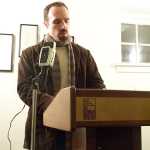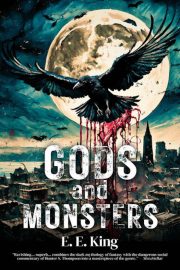How to Win a Short Fiction Contest*
by Shawn Proctor
*Winning not guaranteed.
 In project management, the key is to begin with the end in mind. So maybe I should have foreseen that my flash story “A Good Egg” would be a winner of the 2017 Podcastle Flash Fiction Contest and would go on to become published by Flash Fiction Online as a reprint. Unfortunately, writing with the end goal in mind has never worked for me.
In project management, the key is to begin with the end in mind. So maybe I should have foreseen that my flash story “A Good Egg” would be a winner of the 2017 Podcastle Flash Fiction Contest and would go on to become published by Flash Fiction Online as a reprint. Unfortunately, writing with the end goal in mind has never worked for me.
Instead, here’s a template I follow when entering any fiction contest:
Learn the Rules, Follow the Rules:
After being a fan of Escape Artists for years, I heard Podcastle was hosting a flash fiction contest, so I joined the forum to learn more. I didn’t have an idea yet. I needed to know how the contest was held and whether I could compete. That means knowing the story’s length, deadline, format, submission method, and judging criteria.
I’ve learned long ago that it’s better to not compete than to disqualify myself or submit an entry that doesn’t meet my own standards.
Ideation is Not a Straight Path:
The creative process is different for many people. Some need the rush of impending doom–I mean, a deadline. Others go for walks, work out, or sit in silent contemplation. But my ideation, the process of forming an idea, usually needs something unexpected or new to introduce itself.
In this case, ideation came in the form of a Snapple cap, which contained “Real Facts.” (Their quotation marks, not mine.) One morning I read “Real Fact” #1334: “Nowhere in the Humpty Dumpty nursery rhyme does it say that Humpty Dumpty is an egg.” The riddle stuck in my brain: why was I convinced it was about an egg anyway?
Research the Story, Research the Contest:
I spent a few hours reading everything Humpty Dumpty. The more I read, the more I wondered. If Humpty was an egg, how did he fall? Who was the king at the end? Perhaps it was the recent royal weddings, but I began to picture my egg protagonist at a marriage ceremony. In my early draft, Humpty was heartbroken that the princess was getting married.
As I kept thinking over my small, rough story concept, I read entries from other Escape Artists podcasts, especially winning stories. I noticed the elements and themes that stood out or repeated. Luckily, my still-rough idea about Humpty didn’t appear to have been done before. Yet re-tellings are somewhat common, so mine couldn’t simply tell the expected scenario about Humpty.
Revise, Expand, Cut, Compress
Once I had a draft that was around the 500-word limit, I shared it with my beta readers. The initial responses were good, but I kept thinking about that king. Why would the king be so desperate to put fix Humpty? What if the “breaking” from the rhyme was emotional? A new idea became obvious–the future king had been in love with Humpty, not the princess.
I expanded the section where Humpty talks to the king as well as the relationship between the Humpty and the princess. When the story had everything I wanted, I took my editing blade and cut every sentence that didn’t advance the story and characters. When I felt I couldn’t stand to cut anymore, I kept finding new places to trim. What I didn’t cut was compressed.
Polish and Rethink
Even when a story seems done, I know that there are places that could be improved. For some people, it’s dialogue tags. For me, it’s titles, beginnings, and endings. While I thought my beginning was effective, I kept redrafting the end to make it hit harder. To make sure it was clear and felt like the action went beyond the last sentence.
I also made lists of titles. Then one morning I was listening to a podcast and the host mentioned that a character in a film was “a good egg.” I felt my ears perk up. Turns out “a good egg” is an old-fashioned term meaning a good person with good standards. Just like my protagonist, who is a literal egg.
Sometimes you find the right title. This time the right title found me.
Play by the Rules
The contest had several rounds, and Podcastle‘s forums strictly regulate voting procedures. You should vote for your own story, but you must not influence others to vote for you or reveal yourself as the author of a story.
During several of the EA fiction contests, the moderators had sussed out situations where contestants had used friends or family or technology to manipulate voting. Cheaters get disqualified. The point is cheating means never knowing how far the story may have gotten on its own merit. My story, “A Good Egg,” never placed first in any round during the contest. It advanced by narrow margins, ultimately placing third out of 196 stories. Two other stories in the finals were only three votes behind. Turned out “A Good Egg” was more like a tough cookie.
Be Gracious and Listen Well
The tricky part about a fiction contest–whether or not it is judged in closed sessions or open to the public–is there’s no way of knowing what could happen. I entered the very next contest hosted by Pseudopod with a story that had followed a similar process…it was eliminated in the first round.
Still, the feedback in the forum helped me understand what had gone well and what needed to be improved. And I know that it will help me keep improving the stories that I write. And my goal is always to write a darn good story that grabs the reader and won’t let go. After all, an original, engaging story is always the best way to compete well and (sometimes!) win. And it can take you places that you never expected when you twisted opened a random bottle of raspberry ice tea.
•••
Shawn Proctor’s writing has been published in several literary journals and anthologies, including Podcastle, Flash Fiction Online, Daily Science Fiction, and Galaxy’s Edge. He is also the 2018 Champion of WYRM’s Gauntlet, a multi-round indie writing contest.


